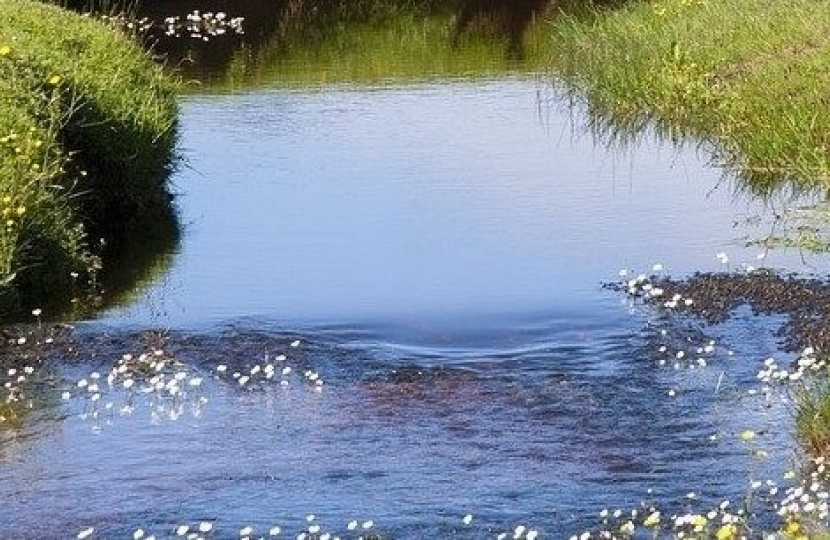
Firstly, I want to stress that I completely share the concerns of my constituents who have contacted me about the use of storm overflows. I want to assure you that I need no convincing as to the importance of ensuring clean and healthy rivers across the country. This is why I have long campaigned to reduce pollution and the impact of storm overflows on our wonderful River Avon.
I want to be clear, the amount of sewage discharge by water companies into our rivers is not acceptable. The Government has made it crystal clear to water companies that they must significantly reduce sewage discharges from storm overflows as a priority. If significant improvements are not made, I have been assured that Ministers will not hesitate to take action through a raft of new measures directly on water companies through the Environment Bill. In fact that is one of the very reasons we wanted to do an Environment Bill in the first place.
I do want to clear up the headlines because it has been quite alarming the way some in the media have painted the votes and I would hate for constituents to get the wrong impression. I did not vote to allow water companies to pump sewage into our rivers as some have suggested in recent days. We actually voted in favour of a package of measures to reduce harms from storm overflows including:
• A new duty directly on water companies to produce comprehensive statutory Drainage and Sewerage Management Plans, setting out how they will manage and develop their drainage and sewerage system over a minimum 25-year planning horizon, including how storm overflows will be addressed through these plans.
• A power of direction for the Government to direct water companies in relation to the actions in these Drainage and Sewerage Management Plans. The Government will not hesitate to use this power of direction if plans are not good enough.
• A new duty on Government to produce a statutory plan to reduce discharges from storm overflows A requirement for Government to produce a report setting out the actions that would be needed to eliminate discharges from storm overflows in England, and the costs and benefits of those actions. Both publications are required before 1 September 2022.
• A new duty directly on water companies and the Environment Agency to publish data on storm overflow operation on an annual basis.
• A new duty directly on water companies to publish near real time information on the operation of storm overflows.
• A new duty directly on water companies to monitor the water quality upstream and downstream of storm overflows and sewage disposal works.
Following debate in the House of Commons, the Government has also announced that they will be further bolstering the measures that we are already taking. The Environment Bill will allow the Government to deliver the most ambitious environmental programme of any country on earth.
The reasons to why I and my colleagues were unable to accept the well-intentioned amendment sponsored by the Duke of Wellington still stand. The complete elimination of discharges from storm overflows would be extremely challenging. Initial assessments suggest that total elimination would cost anywhere from £150 billion to £600 billion. To put this into perspective, £150 billion is more than the entire schools, policing and defence budgets combined. £600 billion is well above what has been spent by the Government in response to the Covid-19 pandemic. This process could involve the complete separation of sewerage systems, leading to potentially significant disruption for homes, businesses, and infrastructure across the country. Customer bill increases, potentially amounting to many hundreds of pounds, and other trade-offs against other water industry priorities would be unavoidable.
While water companies do need to step up and take action to mitigate against this issue, we should recognise the work that they have already done. Between 1990 and 2020, the water industry has invested about £30 billion in environmental improvement work, much of it to improve water quality in rivers. A further £7.1 billion is planned to be invested between 2020 and 2025, of which £3.1 billion will be spent on storm overflows. Labour’s plan to renationalise water would have rendered this investment impossible, whilst passing an additional cost of £90 billion to our constituents. That said there is still more to be done.
Any new law is first introduced as a Bill, into either the House of Commons or the House of Lords. That House will then debate and amend the bill through a number of different stages (First Reading, Second Reading, Committee Stage, Report Stage and Third Reading.) That Bill goes through the exact same process in the next House. Both the House of Commons and the House of Lords need to agree on the wording of the bill before it can be given Royal Assent (approval) by the Queen and then become law. If the two Houses cannot agree on the wording of a bill, they send it back and forth, responding to each other’s proposed changes. This process is known as ‘pingpong’ or officially as ‘consideration of the Lords/Commons amendments’. This is an essential part of our parliamentary democracy and helps to improve legislation proposed in either House.
I have met with representatives from the Environment Agency a lot over the years and I am in regular contact with the EA to discuss the impact of flooding and the maintenance of waterways in our constituency. I will be meeting with Sir James Bevan, Chief Executive of the EA, in the coming weeks. I hope this explanation is helpful and reassures you that any suggestion that I and my colleagues voted to pump sewage into our rivers is false. If you would like any additional information on what I am doing locally to protect our waterways please do not hesitate to contact me via email [email protected] or telephone 01249 704465.

